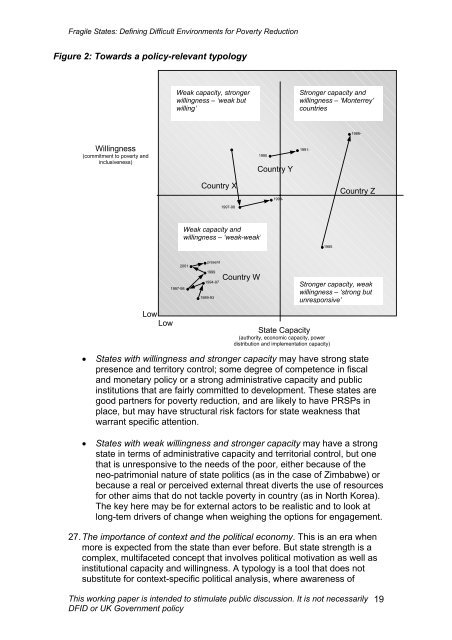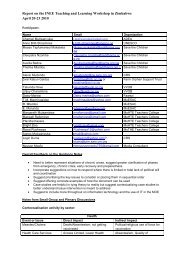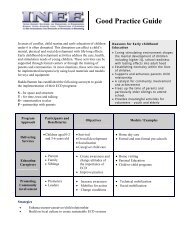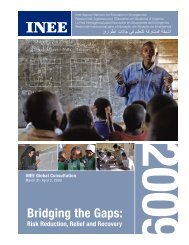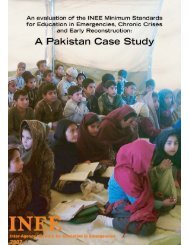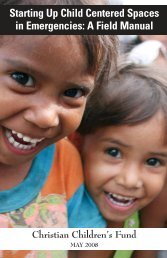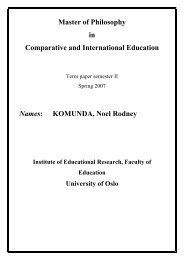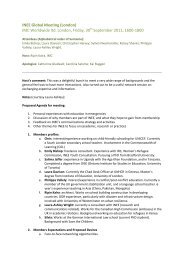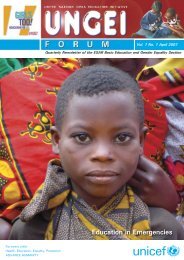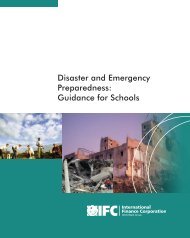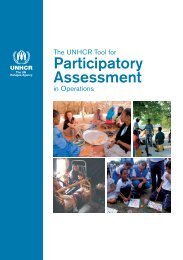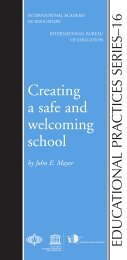Fragile States: Defining Difficult Environments for Poverty ... - INEE
Fragile States: Defining Difficult Environments for Poverty ... - INEE
Fragile States: Defining Difficult Environments for Poverty ... - INEE
You also want an ePaper? Increase the reach of your titles
YUMPU automatically turns print PDFs into web optimized ePapers that Google loves.
<strong>Fragile</strong> <strong>States</strong>: <strong>Defining</strong> <strong>Difficult</strong> <strong>Environments</strong> <strong>for</strong> <strong>Poverty</strong> ReductionFigure 2: Towards a policy-relevant typologyWeak capacity, strongerwillingness – ‘weak butwilling’Stronger capacity andwillingness – ‘Monterrey’countries1986-Willingness(commitment to poverty andinclusiveness)1990Country Y1991-Country X1997-981999-Country ZWeak capacity andwillingness – ‘weak-weak’1985LowLow20011997-98present19991994-971989-93Country WState Capacity(authority, economic capacity, powerdistribution and implementation capacity)Stronger capacity, weakwillingness – ‘strong butunresponsive’• <strong>States</strong> with willingness and stronger capacity may have strong statepresence and territory control; some degree of competence in fiscaland monetary policy or a strong administrative capacity and publicinstitutions that are fairly committed to development. These states aregood partners <strong>for</strong> poverty reduction, and are likely to have PRSPs inplace, but may have structural risk factors <strong>for</strong> state weakness thatwarrant specific attention.• <strong>States</strong> with weak willingness and stronger capacity may have a strongstate in terms of administrative capacity and territorial control, but onethat is unresponsive to the needs of the poor, either because of theneo-patrimonial nature of state politics (as in the case of Zimbabwe) orbecause a real or perceived external threat diverts the use of resources<strong>for</strong> other aims that do not tackle poverty in country (as in North Korea).The key here may be <strong>for</strong> external actors to be realistic and to look atlong-tem drivers of change when weighing the options <strong>for</strong> engagement.27. The importance of context and the political economy. This is an era whenmore is expected from the state than ever be<strong>for</strong>e. But state strength is acomplex, multifaceted concept that involves political motivation as well asinstitutional capacity and willingness. A typology is a tool that does notsubstitute <strong>for</strong> context-specific political analysis, where awareness ofThis working paper is intended to stimulate public discussion. It is not necessarilyDFID or UK Government policy19


